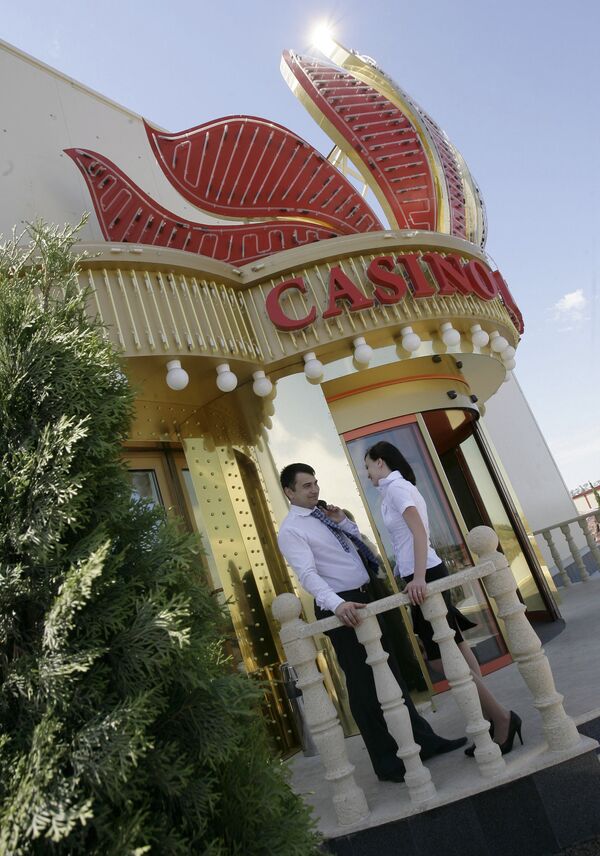The 2009 ban on casinos in Russia had no effect on gambling industries in neighboring states as Russian high-rollers are still reluctant to test their luck in Russia, the CIS and the Baltic States.
Thursday marks the first anniversary since Russia ordered the closure of all gaming establishments except in four specially designated areas - in the Baltic exclave of Kaliningrad, south Siberia's Altai Territory, Primorye in the Far East, and the Azov Sea coast in southern Russia.
The move was met with mixed attitude in neighboring states, with some expecting to profit from Russian high-rollers and others expressing their concern about the possible rise in crime rates.
But the law seems to have little impact both in Russia and abroad - wealthy Russian players still prefer Monaco or Las Vegas to Minsk, Riga or Yerevan.
According to official reports, the gambling industry in Russia was thriving with turnover estimated at $6 billion in 2008. Casinos paid almost $1 billion in taxes that year.
RUSSIA: FIRST CASINO OPENS IN GAMBLING ZONE
The Russian gambling industry had asked for a delay to casino closures and their relocation, saying the zones situated in remote poorer regions would not attract many visitors, and the designated areas needed several more years of development, but the 2007 law came into force as scheduled.
Russia's first casino in a special gambling zone opened in the south of the country seven months after all gambling establishments had to close or relocate.
The casino, run by the Royal Time company from Russia's Volga Republic of Tatarstan, now offers a slot machine arcade, a casino and a VIP casino hall to its visitors.
Owners say the casino attracts from 100 to 400 people daily, mainly locals and residents of neighboring Krasnodar and Rostov-on-Don.
KAZAKHSTAN, UKRAINE BAN ROULETTE
Some of Russia's neighbors and CIS partners have also banned or limited gambling. Some countries have also banned or restricted gambling while casinos in other states do nor meet the requirements of Russian gamblers.
Following the example of its northern neighbor, Kazakhstan has also limited gambling to three specially designated zones, but construction was not yet even started there.
Ukraine's parliament temporarily banned casinos in June 2009, after a fire broke out in a casino in Dnepropetrovsk, to the southeast of Kiev, killing nine people and injuring 11. The government, however, plans to reopen casinos in five-star hotels in major cities, as well as in resort cities in the Carpathian Mountains in the west and the Crimean Peninsula in the south.
MOLDOVA, ARMENIA, LATVIA SEE NO DIFFERENCE
Sources in the Moldovan gambling industry said the Russian ban had no influence on the country's gambling industry.
"Modovan casinos are just below the standards of Russian players," said Galina Voloshchenko, a spokeswoman for Moldova's gambling association.
Armenian officials said they had no official statistics on Russian gamblers visiting the country.
"I can just say that as of June 1, 2008, there were 11 casinos in Armenia, their number grew to 12 as of June 1, 2009. But I have no data confirming that it was caused by the inflow of Russians into Armenian casinos," a spokesman for Armenia's finance ministry said.
The Baltic Course online portal said a recently announced plan to establish a major gaming center in Riga required large investments, but no investor has stepped forward so far.
"I also do not think that wealthy residents of Moscow, St. Petersburg or other Russian cities will travel to Riga for gaming," the portal quoted Latvian Gaming Business Association's advisor Arnis Marcinkevics as saying.
"Imagine you are an investor who is about to invest a billion euros in the development of a casino and hotel complex. If you were to choose between the Baltic Sea coast, where sunny days are rare, and Spain - what would you choose?" said Andrejs Jerkins, who heads the Olympic Casino Latvia Marketing Department.
NO "GAMBLING PARADISE" IN MINSK
This March Belarusian President Alexander Lukashenko approved a new plan to develop the country's gambling industry in a bid to take advantage of Russian gaming restrictions.
"The gambling industry can and must become an additional source of building up the budget by means of taxes, and will help create new jobs, and attract tourists and investment," the president said.
"We have every opportunity to gain a leading position in this sensitive sphere against a background of the changes in the Russian and Ukrainian legislation," Lukashenko added.
The number of casinos in Belarus has increased in the past 12 months as several Russian companies opened their gambling facilities there.
"Several large Russian companies, such as Shangri La and Vulkan have entered the Belarusian market," a Belarusian casino owner, who spoke on the condition of anonymity, said.
"If Belarus hoped to attract Russian high-rollers, the authorities should have created [favorable condition], not just sit and wait for Moscow casinos to close," he added.
He said that about 20 illegal casinos are still operating in Russia, according to his information.
MOSCOW, July 1 (RIA Novosti)




